A nurse is caring for a client who is scheduled to undergo an esophagogastroduodenoscopy. Which of the following actions should the nurse take in preparation for the procedure?
Shave the client from axillae to groin.
Administer a cleansing enema.
Have the client drink contrast medium.
Ensure the signed consent is in the medical record.
The Correct Answer is D
Choice A reason: Shaving the client from axillae to groin is not necessary, as it has no relation to the procedure and can cause skin irritation or infection.
Choice B reason: Administering a cleansing enema is not required, as it does not affect the upper gastrointestinal tract that is examined by the procedure. The client should fast for at least 6 hours before the procedure to ensure an empty stomach.
Choice C reason: Having the client drink contrast medium is not indicated, as it can interfere with the visualization of the mucosa and lesions by the endoscope. The client may receive a local anesthetic spray or gargle to numb the throat and a sedative to relax and reduce discomfort during the procedure.
Choice D reason: Ensuring the signed consent is in the medical record is an essential action, as it indicates that the client has been informed about the purpose, risks, benefits, and alternatives of the procedure and has agreed to undergo it voluntarily.
Nursing Test Bank
Naxlex Comprehensive Predictor Exams
Related Questions
Correct Answer is A
Explanation
Choice A: This is correct because placing electrical cords against the wall can prevent tripping and falling, which can cause injury or dislocation of the hip prosthesis. The nurse should instruct the client to remove any clutter or obstacles from the floor and use assistive devices such as a walker or cane.
Choice B: This is incorrect because placing a throw rug next to the bathtub can increase the risk of slipping and falling, especially when the floor is wet. The nurse should instruct the client to avoid using throw rugs or mats and install grab bars and non-skid mats in the bathroom.
Choice C: This is incorrect because keeping pot handles turned toward the edge of the stove can cause burns or spills, which can also lead to falls or infections. The nurse should instruct the client to turn pot handles inward or use the back burners of the stove.
Choice D: This is incorrect because storing extra blankets in a box on the steps can obstruct the access to the stairs and pose a hazard for falling. The nurse should instruct the client to store extra blankets in a closet or drawer and use handrails when using the stairs.
Correct Answer is D
Explanation
Choice A reason: Maintaining the client on bed rest is not an appropriate action, as it can increase the risk of thromboembolism, infection, or atelectasis after surgery. The nurse should encourage early ambulation and exercise as tolerated by the client.
Choice B reason: Decreasing the client's fluid intake is not an appropriate action, as it can cause dehydration, constipation, or impaired wound healing after surgery. The nurse should encourage adequate hydration and nutrition to promote recovery and drainage.
Choice C reason: Applying cold compresses to the site is not an appropriate action, as it can cause vasoconstriction, inflammation, or pain at the site. The nurse should apply warm compresses to the site to facilitate drainage and reduce swelling.
Choice D reason: Placing the right leg in a dependent position is an appropriate action, as it can promote gravity-assisted drainage from the site and prevent fluid accumulation or infection. The nurse should place the drain below the level of the wound and secure it to prevent dislodgment or tension.

Whether you are a student looking to ace your exams or a practicing nurse seeking to enhance your expertise , our nursing education contents will empower you with the confidence and competence to make a difference in the lives of patients and become a respected leader in the healthcare field.
Visit Naxlex, invest in your future and unlock endless possibilities with our unparalleled nursing education contents today
Report Wrong Answer on the Current Question
Do you disagree with the answer? If yes, what is your expected answer? Explain.
Kindly be descriptive with the issue you are facing.
